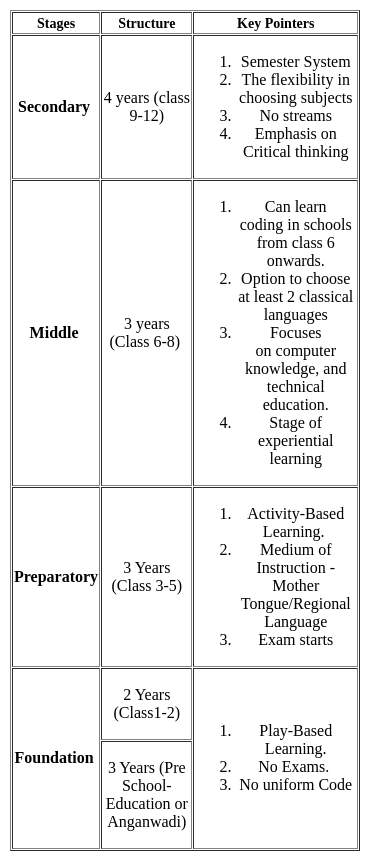Software Development Exam > Software Development Tests > Test: NEP 2020 (III) - Software Development MCQ
Test: NEP 2020 (III) - Software Development MCQ
Test Description
10 Questions MCQ Test - Test: NEP 2020 (III)
Test: NEP 2020 (III) for Software Development 2025 is part of Software Development preparation. The Test: NEP 2020 (III) questions and answers have been prepared
according to the Software Development exam syllabus.The Test: NEP 2020 (III) MCQs are made for Software Development 2025 Exam.
Find important definitions, questions, notes, meanings, examples, exercises, MCQs and online tests for Test: NEP 2020 (III) below.
Solutions of Test: NEP 2020 (III) questions in English are available as part of our course for Software Development & Test: NEP 2020 (III) solutions in
Hindi for Software Development course.
Download more important topics, notes, lectures and mock test series for Software Development Exam by signing up for free. Attempt Test: NEP 2020 (III) | 10 questions in 10 minutes | Mock test for Software Development preparation | Free important questions MCQ to study for Software Development Exam | Download free PDF with solutions
Test: NEP 2020 (III) - Question 1
Which of the following statements is proposed in National Education Policy 2020?
Detailed Solution for Test: NEP 2020 (III) - Question 1
Test: NEP 2020 (III) - Question 2
Which classes are included in the preparatory stage as per the new education policy 2020?
Detailed Solution for Test: NEP 2020 (III) - Question 2
Test: NEP 2020 (III) - Question 3
As per NEP-2020, the responsibility to develop Adult Education Framework has been given to which one of the following organisations?
Detailed Solution for Test: NEP 2020 (III) - Question 3
Test: NEP 2020 (III) - Question 4
National Education Policy 2020 proposes that ________ should be encouraged to promote ________.
Detailed Solution for Test: NEP 2020 (III) - Question 4
Test: NEP 2020 (III) - Question 5
As per the NEP 2020, the Rajasthan government has decided to come up with a new syllabus that includes 3 languages, which are-
Detailed Solution for Test: NEP 2020 (III) - Question 5
Test: NEP 2020 (III) - Question 6
Which of the following is proposed in National Education Policy 2020?
(i) Learning how to learn
(ii) Increasing course content
(iii) 360-degree holistic progress report card
(iv) Standardized curriculum, pedagogy, and assessment
Choose the correct option.
Detailed Solution for Test: NEP 2020 (III) - Question 6
Detailed Solution for Test: NEP 2020 (III) - Question 7
Detailed Solution for Test: NEP 2020 (III) - Question 8
Test: NEP 2020 (III) - Question 9
Which of the following does National Education Policy 2020 propose in the content of the assessment?
Detailed Solution for Test: NEP 2020 (III) - Question 9
Test: NEP 2020 (III) - Question 10
Which of the following statement is NOT correct as per NEP 2020?
Detailed Solution for Test: NEP 2020 (III) - Question 10
Information about Test: NEP 2020 (III) Page
In this test you can find the Exam questions for Test: NEP 2020 (III) solved & explained in the simplest way possible.
Besides giving Questions and answers for Test: NEP 2020 (III), EduRev gives you an ample number of Online tests for practice
Download as PDF



















